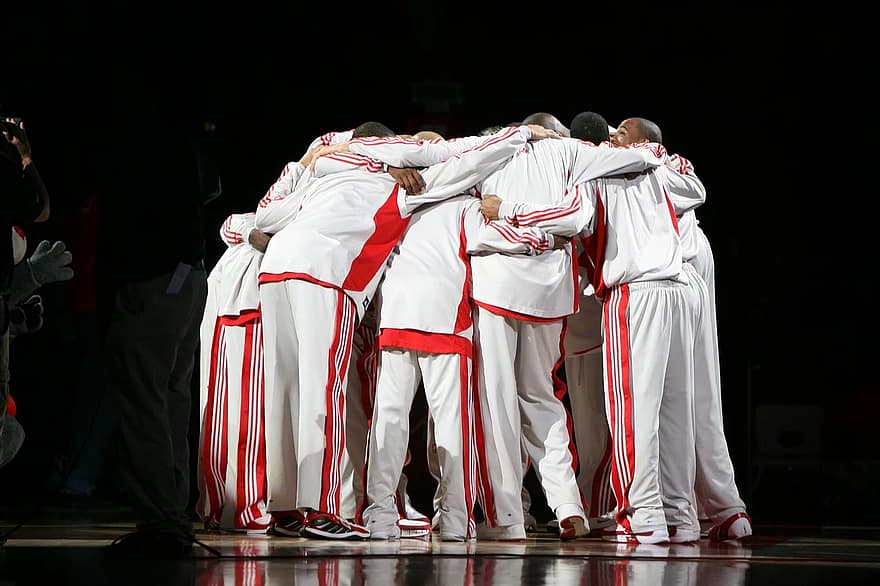
One day my high school basketball coach gave our team an unusual exercise. He split us into two groups and put us into two separate rooms. He told us our objective was to get the most possible points for our team, and gave us a sheet of paper with a bunch of instructions on it. I don’t remember all of the details, but they were roughly as follows:
In a series of rounds, each team was to choose either “Red” or “Blue;” if both groups chose Red, both would earn 3 points, if both groups chose Blue, both would lose 3 points. But if one group chose blue while the other group chose red, the group that chose blue would earn 6 points and the group that chose red would lose 6 points. In the first few rounds, the groups were not allowed to communicate with one another; in later rounds, representatives from each group were given short opportunities to discuss their plans with each other.
So which would you choose? Which did we? I remember lots of debate in my group – could we trust the others to choose Red so that we would both earn points? Or would they “backstab” us and choose Blue, causing us to lose big while they would win big?
I have since recognized this game as a classic prisoner’s dilemma, in which detectives try to play prisoners off of each other as they interrogate them in separate rooms. It is used as a metaphor for the collective action challenges facing any two groups negotiating with each other. It explains, for example, why it is so hard for Democrats and Republicans to reach a deal on social security or healthcare reform – both fear that the other side will attack them to score political points if they try to offer a reasonable compromise.
But what was most memorable about playing this game with my basketball team was what our coach said at the end of it. After we went through several rounds of each group experimenting with picking Red, getting burned, and then both consistently picking Blue, we counted up our points and one group celebrated for having edged out the other. But Coach simply said something to the effect of, “I never said you were supposed to win points for just half your team.” And then he made us run a LOT.
This for me is an even better metaphor for our current politics. We think the objective is for our party – our “team” – to win as many elections and policy debates as possible. This paradigm has been called “teamsmanship,” or “tribalism,” or “hyper-partisanship;” but whatever the name, it misses what should be the real point of politics. It should not be about one side winning or losing, it should be about both sides – all sides – winning at least a little bit. Our coach’s point was that it was the cumulative score of the two groups that mattered, not how much one group beat the other group by. And so it is with effective governance – it should take into account the interests and concerns of all the people, not just those who voted for the party in power. We are all, ultimately, on one team.
This logic is embedded in the Deliberative Citizenship Initiative’s new Deliberative “D” Teams Program. These teams are made up of 5-10 people with diverse perspectives and backgrounds who have committed to meet biweekly to discuss important issues and get to know people outside their normal social, academic and professional circles. At this time of intense feelings, rapid change, and hyper-polarization, D Teams create spaces for people to come together to explore how and why their perspectives are both similar and different – and to begin building common solutions to our collective challenges.
We call them “Teams” to emphasize that even though participants may have significant differences of opinion, they are all on the same team, working together to understand and map the terrain of those differences, uncover the experiences and assumptions that they are based on, and work towards new possibilities that can reconcile and transcend those differences.
To experience this process of exploration and discovery, we encourage you to sign up for a D Team today. In just three hours a month, these teams will enable you to practice your deliberative citizenship skills of listening actively, expressing yourself authentically, and engaging with others deeply and respectfully. They are open to all Davidson faculty, staff, students, alumni, and community members and provide a great way to connect with others either online or in a socially distanced in-person format.
Sign-ups are available through a form on the DCI’s WildcatSync page at the beginning of every semester. Individuals can state their preference for a variety of D Team options, including in-person vs. virtual formats. D Teams will be scheduled at a variety of times – e.g. weekday mornings over breakfast, during the lunch hour, in the evenings, Saturday mid-morning, Sunday afternoon – to accommodate everyone’s different schedules as much as possible.
If you have any questions, please visit the DCI’s D Teams webpage or email dci@davidson.edu. And please forward this post onto anyone you know who might be interested in learning about this opportunity.
